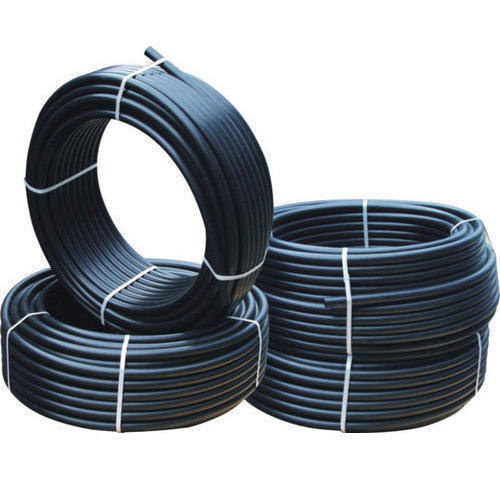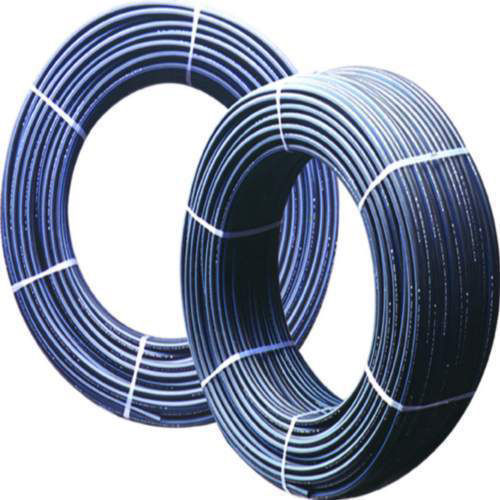
Agricultural Coil Pipe
70 INR/Meter
Product Details:
- Product Type Coil Pipe
- Material HDPE
- Length 18 meter Meter (m)
- Color Black
- Click to view more
X
Agricultural Coil Pipe Price and Quantity
- 70 INR/Meter
- 1000 Meter
Agricultural Coil Pipe Specification
- 18 meter Meter (m)
- HDPE
- Black
- Coil Pipe
Agricultural Coil Pipe Trade Information
- 10000 Meter Per Day
- 2-7 Days
Product Description
Leveraging on our state-of-the-art infrastructural unit, we have been a proud manufacturer of Agricultural Coil Pipe for our highly honoured clients. It is designed with utmost precision at our end, making use of best quality HDPE and advanced machinery. We offer this pipe in a wide range of dimensions and specifications which fits in the requirements of our varied patrons. We offer this pipe at highly affordable prices and strive to make delivery within a given time period.
Uses of Agricultural Coil Pipe:
1. Drip Irrigation: The primary use of agricultural coil pipes is for drip irrigation systems. Drip irrigation involves delivering water directly to the base of each plant, minimizing water wastage and reducing the risk of fungal diseases caused by excessive moisture on plant leaves. Coil pipes are laid out along rows of crops, and small openings or emitters allow water to drip slowly onto the soil.
2. Water Conservation: Agricultural coil pipes are designed to minimize water wastage. By providing water directly to the plants' root zones, they reduce evaporation and runoff, which are common issues with traditional surface irrigation methods. This water-saving feature is especially important in regions facing water scarcity.
3. Precision Irrigation: Coil pipes enable precise control over the amount of water each plant receives. This precision is crucial for optimizing plant growth, as different crops and soil types have varying water requirements. Farmers can adjust the flow rate of water to different sections of the field, ensuring that plants receive the right amount of water they need.
4. Minimizing Weed Growth: Drip irrigation using coil pipes targets the plant roots, which helps prevent weed growth. Surface irrigation methods often result in water being spread across the entire field, which can inadvertently encourage weed growth. By reducing water on unplanted areas, coil pipes help control weeds.
5. Reduced Labor and Energy Costs: Drip irrigation systems using agricultural coil pipes are automated and require less labor compared to manual irrigation methods. This reduces the need for constant monitoring and manual labor associated with traditional irrigation techniques. Additionally, since water is applied directly to the plants, energy costs associated with pumping and distributing water across the field are reduced.
6. Fertilizer Application: Some agricultural coil pipes are designed to allow the controlled release of fertilizers along with water. This ensures that nutrients are delivered directly to the root zones of plants, promoting efficient nutrient uptake and reducing nutrient leaching.
7. Suitable for Various Terrain: Agricultural coil pipes are flexible and can be easily adjusted to suit different terrains and crop layouts. Whether the land is flat, sloped, or uneven, coil pipes can be laid out in a way that ensures uniform water distribution.
8. Compatibility with Automation: Agricultural coil pipes can be integrated with automated irrigation systems, weather sensors, and controllers. This enables farmers to remotely monitor and adjust irrigation schedules based on real-time weather conditions, soil moisture levels, and plant needs.
Advantages of Agricultural Coil Pipe:
1. Water Efficiency: Drip irrigation systems using agricultural coil pipes deliver water directly to the plant root zones, minimizing water wastage through evaporation and runoff. This targeted approach ensures that water reaches the plants where it's needed most, leading to higher water use efficiency.
2. Reduced Water Stress: By providing a consistent and controlled water supply to plants, agricultural coil pipes help prevent water stress. Plants are less likely to experience periods of drought stress, which can lead to stunted growth, reduced yields, and lower crop quality.
3. Precise Water Application: Coil pipes allow farmers to adjust the flow rate and frequency of water delivery, ensuring that each plant receives the optimal amount of water. This precision is essential for tailoring irrigation to different crop types, growth stages, and soil conditions.
4. Minimized Weed Growth: Since water is delivered directly to the plant roots, there is less moisture on the soil surface, reducing weed growth. This can decrease the need for manual weeding or the use of herbicides.
5. Reduced Fungal Diseases: Traditional overhead irrigation methods can lead to fungal diseases on plant leaves due to prolonged moisture on foliage. Drip irrigation using coil pipes minimizes water contact with leaves, decreasing the risk of diseases caused by excess moisture.
6. Energy and Labor Savings: Automated drip irrigation systems using agricultural coil pipes require less labor and energy compared to manual irrigation methods or traditional overhead sprinklers. This reduces the time and resources required for irrigation operations.
7. Suitable for Sloped and Uneven Terrain: Agricultural coil pipes are flexible and can be laid out to match the contours of the land, making them suitable for sloped, uneven, or irregularly shaped fields.
8. Reduced Soil Erosion: By delivering water directly to the soil at a controlled rate, agricultural coil pipes help reduce soil erosion caused by heavy rainfall or excessive water flow.
9. Enhanced Nutrient Management: Some coil pipes are designed to allow the simultaneous delivery of water and nutrients (fertilizers or amendments). This enables plants to receive nutrients directly at their root zones, promoting efficient nutrient uptake and minimizing nutrient leaching.
10. Scalability and Modularity: Agricultural coil pipes can be easily extended or modified to accommodate changes in field layout, crop rotation, or expansion. This scalability makes them adaptable to evolving agricultural needs.
11. Improved Crop Health and Yields: By providing consistent moisture and nutrients to plants, agricultural coil pipes contribute to healthier plants and increased crop yields.
12. Environmental Sustainability: The water-saving features of agricultural coil pipes contribute to water conservation, making them an environmentally sustainable irrigation solution, especially in regions facing water scarcity.
FAQ:
1. What is an agricultural coil pipe?
Ans: An agricultural coil pipe, also known as a drip irrigation pipe or tubing, is a flexible tube used in modern farming to deliver water directly to plant root zones. It's designed to reduce water wastage, improve water use efficiency, and enhance crop growth.
2. How does a drip irrigation system work with agricultural coil pipes?
Ans: A drip irrigation system using agricultural coil pipes involves laying out these pipes along rows of crops. Small openings or emitters in the pipe allow water to drip slowly onto the soil, directly irrigating the plants' root zones.
3. What are the advantages of using agricultural coil pipes for irrigation?
Ans: Advantages include water efficiency, reduced water stress for plants, precise water application, minimized weed growth, decreased risk of fungal diseases, energy and labor savings, adaptability to uneven terrain, enhanced nutrient management, and improved crop health and yields.
4. Can agricultural coil pipes be used on sloped fields?
Ans: Yes, agricultural coil pipes are flexible and can be easily adjusted to fit sloped and uneven terrain, making them suitable for a variety of field types.
5. Are there different types of emitters for agricultural coil pipes?
Ans: Yes, there are various emitter types available, such as inline emitters, pressure-compensating emitters, and adjustable emitters. These emitters control the rate of water flow and ensure uniform water distribution along the length of the pipe.
6. How do agricultural coil pipes help conserve water?
Ans: Agricultural coil pipes minimize water wastage by delivering water directly to the root zones of plants. This targeted approach reduces evaporation, runoff, and overspray, resulting in more efficient water use.
7. Can agricultural coil pipes be automated?
Ans: Yes, many modern drip irrigation systems using agricultural coil pipes can be automated. They can be integrated with timers, controllers, and even weather sensors to optimize irrigation schedules based on plant needs and environmental conditions.
8. Are agricultural coil pipes suitable for all types of crops?
Ans: Yes, agricultural coil pipes can be used for a wide range of crops, including vegetables, fruits, ornamentals, and more. They are particularly beneficial for crops with specific water requirements and those susceptible to water-related diseases.
9. Do agricultural coil pipes reduce the need for manual weeding?
Ans: Yes, using drip irrigation with agricultural coil pipes can help reduce weed growth since water is directed only to the plant roots. This minimizes moisture on the soil surface, which can discourage weed germination and growth.
10. How do agricultural coil pipes contribute to sustainable agriculture?
Ans: Agricultural coil pipes promote sustainable agriculture by conserving water resources, minimizing the use of fertilizers and pesticides (due to reduced runoff), and improving overall crop health and productivity.
11. Can agricultural coil pipes be used in greenhouse farming?
Ans: Yes, agricultural coil pipes are suitable for greenhouse farming as well. They provide precise irrigation control and help maintain optimal moisture levels for greenhouse crops.
12. Are agricultural coil pipes easy to install and maintain?
Ans: Yes, agricultural coil pipes are relatively easy to install and maintain. They require periodic checks for clogs and damage to ensure proper water distribution.
13. What is the lifespan of agricultural coil pipes?
Ans: The lifespan of agricultural coil pipes can vary depending on the quality of the material and environmental factors. High-quality pipes can last for several years when properly maintained.
14. Can agricultural coil pipes be recycled?
Ans: Some types of agricultural coil pipes are recyclable, depending on the material they are made from. However, it's important to check with local recycling facilities for proper disposal methods.
15. Are there any disadvantages to using agricultural coil pipes?
Ans: While agricultural coil pipes offer numerous benefits, they may have upfront installation costs and require regular maintenance to prevent clogs or damage to emitters.
Tell us about your requirement

Price:
Quantity
Select Unit
- 50
- 100
- 200
- 250
- 500
- 1000+
Additional detail
Mobile number
Email







 Call Me Free
Call Me Free
